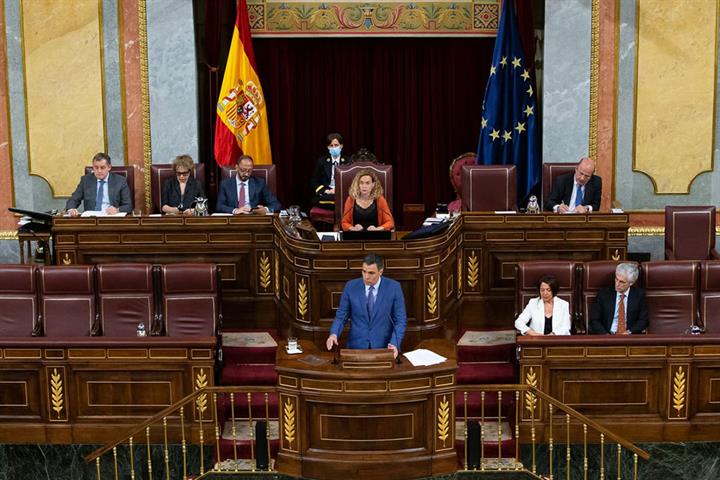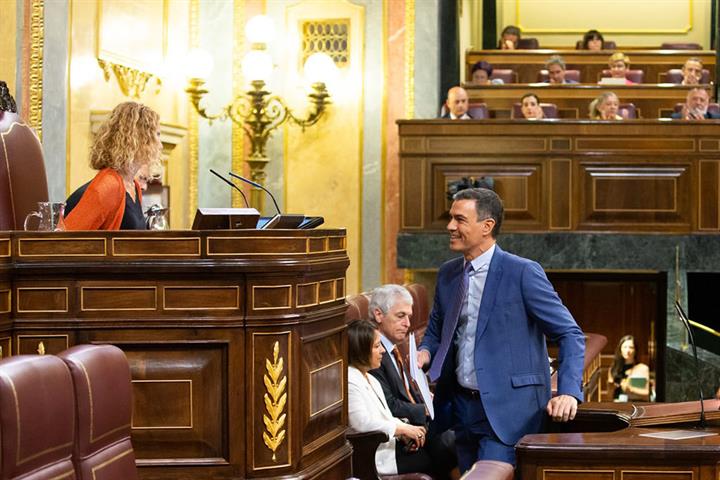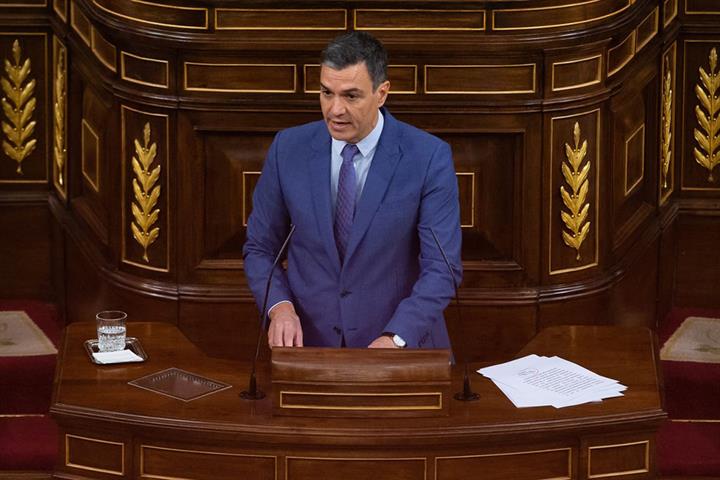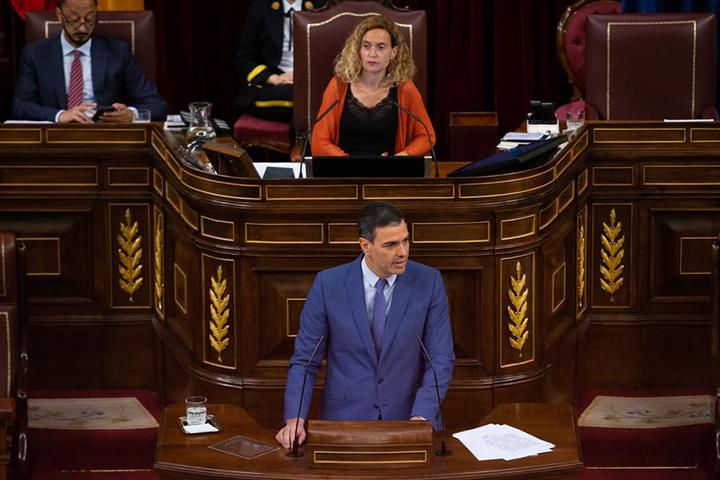Sánchez asks parliamentary groups to support extension of war protection for families and businesses
President's News - 2022.6.8
Lower House of Parliament, Madrid
 Pedro Sánchez during his appearance before the plenary session of the Lower House of Parliament | Foto: Pool Congreso
Pedro Sánchez during his appearance before the plenary session of the Lower House of Parliament | Foto: Pool Congreso
The President of the Government of Spain, Pedro Sánchez, has appeared before the plenary session of the Lower House of Parliament to report on the extraordinary European Council of 30 and 31 May, and on Spain's relations with Morocco.
The Council meeting reaffirmed the strongest condemnation of the Russian invasion of Ukraine, the commitment to assist the country in the humanitarian and military field in investigating alleged crimes against humanity and the task of receiving refugees. Sánchez pointed out that Spain ranks fifth in terms of the number of Ukrainians who have been offered temporary protection status, with more than 117,000 people, "something we should all be proud of".
The Council also warned of the need to support Ukraine's neighbours, a support that the President of the Government of Spain expressed last Friday in Moldavia. Sánchez pointed out that the EU states also agreed on the importance of responding to the "false Russian narrative" and on making it clear that Vladimir Putin is responsible for global supply and inflation problems.
Ukraine reconstruction and Russia sanctions
The Chief Executive reviewed the actions for economic and financial support to Ukraine that were discussed at the meeting, advocating "thinking now about the next reconstruction of the country". This is a task, he said, that will require many years and a great effort by the entire international community, with the leadership of the European Union.
 Pedro Sánchez going up to the rostrum to appear before the plenary session of the Lower House of Parliament | Foto: Pool Congreso
Pedro Sánchez going up to the rostrum to appear before the plenary session of the Lower House of Parliament | Foto: Pool Congreso
Pedro Sánchez highlighted the EU's effective, united and solidarity response, which led to the unblocking of the sixth package of sanctions against Putin and his oligarchs, including restrictions on importing Russian oil. These measures also have costs for the European and Spanish economy, "but much greater would be the cost of not defending our principles and values", he argued.
Protection of families and businesses
In the president's view, this unity extended to an issue that was central at recent European Council meetings: energy.
Sánchez assured that the price cap on gas used to produce energy in the Iberian market will be approved "very soon", which will reduce electricity prices by between 15 and 20 percent and protect against future gas price rises in international markets. He explained that once approved in Brussels, it will automatically come into force following validation of the Royal Decree-Law that regulates it, which will be voted on next Thursday.
The Chief Executive has asked the Lower House of Parliament to support this mechanism, as well as the extension of the measures contained in the National War Response Plan,, which expires on 30 June. "The consequences of the war are still here, which is why we are going to extend the measures that protect families and businesses in our country, and I formally request the support of all the parliamentary groups," he said.
Sánchez also called for accelerating the energy transition and moving towards a green and integrated European energy market. Spain is taking an active role in this process and, thanks to European funds, is re-industrialising. One example is the PERTE Electric and Connected vehicle: A total of 13 large groupings of companies have applied for the call, with 487 projects that will mobilise a minimum of 12 billion euros, he said.
 Pedro Sánchez during his appearance before the plenary session of the Lower House of Parliament | Foto: Pool Congreso
Pedro Sánchez during his appearance before the plenary session of the Lower House of Parliament | Foto: Pool Congreso
Food security and defence policy
The European Council also discussed the impact of war on global food security. Together with its European partners, Spain is promoting international measures so that the most affected countries have the resources to face the crisis, in particular initiatives "that contribute to mitigating the vulnerabilities associated with high levels of external debt", according to Sánchez.
Russian aggression, he added, also calls for strengthening the common security and defence policy and military capabilities, as well as increasing cooperation with NATO. "Spain is a country that symbolises very well the dual commitment to the European Union and NATO, and the upcoming NATO summit in Madrid will be a great opportunity to move forward" in this direction, he said.
Relations with Morocco and the Sahara
With respect to the new stage in relations between Spain and Morocco, the Chief Executive stated that it is in the interests of both countries, especially families and businesses on both sides of the border, and that the Joint Declaration "builds a system of guarantees" that includes, first and foremost, territorial integrity. "Spanish sovereignty over Ceuta and Melilla is beyond doubt, as in any other part of the national territory," he said.
The normalisation of relations, he added, means re-establishing all maritime connections, the gradual opening of border crossings and the preparation of Operation Crossing the Strait. Spain and Morocco have also undertaken to ensure the necessary customs instruments to regulate the normal traffic of people and goods.
 Pedro Sánchez appears before the plenary session of the Lower House of Parliament | Foto: Pool Congreso
Pedro Sánchez appears before the plenary session of the Lower House of Parliament | Foto: Pool Congreso
The Joint Declaration also involves "relaunching and strengthening" cooperation on migration. "Spain will not tolerate the instrumentalisation of the tragedy of irregular migration as a weapon of pressure. And, vis-à-vis irregular migration, the best instrument is international cooperation for an orderly management of migratory flows", said Sánchez.
This cooperation should be extended to the bilateral economic agenda, infrastructures and specific areas such as education, culture, sport and scientific research. Sánchez has advanced that the working group on the delimitation of maritime spaces on the Atlantic coast, which has not met for fifteen years, will be reactivated. The Canary Islands will be fully involved in this work and its interests will continue to be considered a priority, he assured.
As for Western Sahara, the Chief Executive reiterated that the Moroccan proposal for autonomy is "the most serious, credible and realistic basis" for resolving "a conflict that has been going on for too long", and that Spain has not dissociated itself from the cause of the Sahrawi people. The solution, he stressed, will have to be accepted by both sides and meet the conditions set out in the UN Charter and its resolutions. The active search for an agreement is the responsibility of the UN Secretary General's personal envoy, to whom the president has reaffirmed "his full support".
Non official translation




